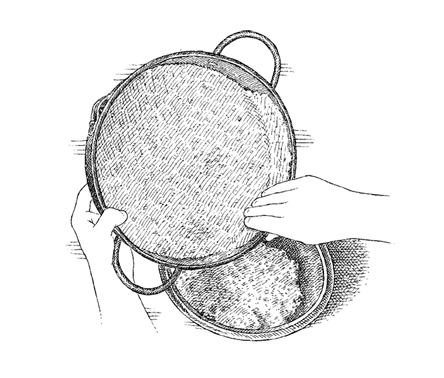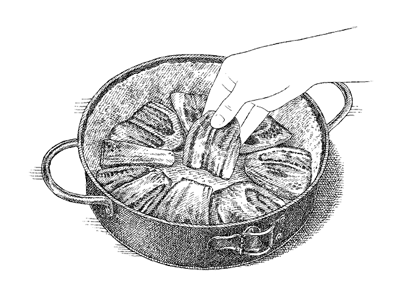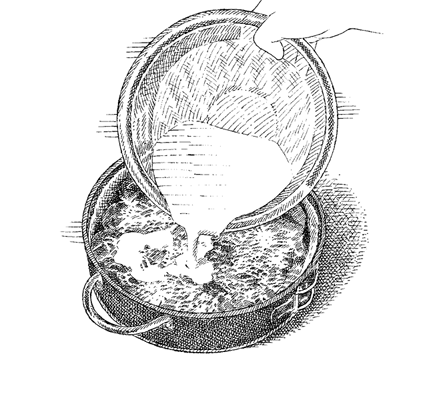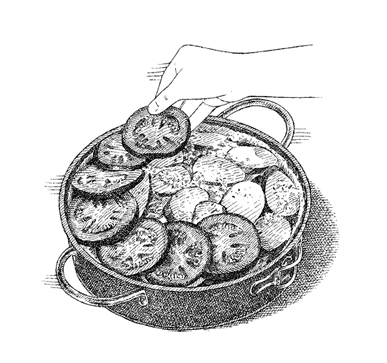The Cook's Illustrated Cookbook (139 page)
Read The Cook's Illustrated Cookbook Online
Authors: The Editors at America's Test Kitchen
Tags: #Cooking
Frozen packaged phyllo dough functions as light, flaky pastry in traditional Greek dishes such as baklava and spanakopita and as a ready-made tart crust or wrapper for both sweet and savory fillings. But the tendency of these paper-thin sheets to tear, dry out quickly, or stick together can be maddening. Here are some tips for mastering this delicate dough.

1.
To help prevent cracking, phyllo must be kept moist until you’re ready to work with it. The usual approach is to cover the stack with a damp kitchen towel. But it’s all too easy to overmoisten the towel and turn the dough sticky. We prefer to cover the stack with plastic wrap to protect the phyllo and then a damp towel.

2.
Because phyllo is so fragile, some sheets crack and even tear while still in the box. Don’t worry about rips, just make sure to adjust the orientation of the sheets as you stack them so that cracks in different sheets don’t line up.

3.
When phyllo sheets emerge from the box fused at their edges, don’t try to separate the sheets. Instead, trim the fused portion and discard.
![]() WHY THIS RECIPE WORKS
WHY THIS RECIPE WORKS
Vegetable tortas can be eye-catching showstoppers that often turn out to be piles of soggy, bland vegetables. For a four-star, make-ahead vegetable torta showcasing flavorful late-summer vegetables, we knew we would have to figure out the best approach for removing as much moisture as possible from the vegetables. We began by salting and pressing the eggplant, zucchini, and tomatoes. Extensive testing proved that each vegetable would require a unique step to complete the job. The eggplant and zucchini required precooking—we roasted the eggplant in a 450-degree oven until browned and dry and microwaved the more delicate zucchini between paper towels weighted with a plate. The salted and drained tomatoes, however, didn’t require precooking—they continued to dry out while being baked right on top of the torta. A simple egg custard bound the vegetables together and a bread-crumb crust protected the edges from sticking and burning.
See “ASSEMBLING VEGETABLE TORTA” illustrations that follow recipe.
SERVES 6 TO 8 AS A MAIN COURSE OR 8 TO 10 AS A SIDE DISH
To prevent sticking, the eggplant slices are roasted on wire racks set in rimmed baking sheets. Alternatively, they can be roasted directly on well-oiled baking sheets; after roasting, use a thin spatula to carefully remove the slices. Hard Italian Asiago is too mild for this recipe—use a domestic Asiago (available in supermarkets) that yields to pressure when pressed. The torta is best served warm or at room temperature.
VEGETABLES
3 | pounds eggplant, peeled, halved crosswise, and cut lengthwise into ¹⁄ |
Kosher salt | |
3 | tablespoons olive oil, plus extra for brushing wire racks |
1 | garlic head, outer papery skin removed and top third of head cut off and discarded |
Pepper | |
2 | red bell peppers |
2 | large tomatoes, cored and cut into ¹⁄ |
4 | zucchini, cut ¹⁄ |
CRUST
4 | slices hearty white sandwich bread, torn into quarters |
3 | tablespoons unsalted butter, melted |
2 | ounces Asiago cheese, grated fine (1 cup) |
CUSTARD AND GARNISH
3 | large eggs |
¹⁄ | cup heavy cream |
2 | teaspoons minced fresh thyme |
2 | tablespoons fresh lemon juice |
3 | ounces Asiago cheese, grated fine (1¹⁄ |
2 | tablespoons shredded fresh basil |
1. FOR THE VEGETABLES:
Line baking sheet with triple layer of paper towels and set aside. Toss eggplant slices with 1 tablespoon salt in large bowl. Transfer to colander and let drain until eggplant releases about 2 tablespoons liquid, about 30 minutes. Wipe excess salt from eggplant. Arrange eggplant slices in single layer on prepared baking sheet, then cover with another triple layer of paper towels. Firmly press each slice to flatten and remove as much liquid as possible.
2.
While eggplant drains, adjust oven racks to upper-middle and lower-middle positions and heat oven to 450 degrees. Set 2 wire racks in 2 rimmed baking sheets and brush both racks with oil. Place garlic, cut side up, on sheet of aluminum foil and drizzle with 1¹⁄
2
teaspoons oil. Wrap foil tightly around garlic and set aside.
3. Arrange salted and pressed eggplant slices on oiled racks. Brush slices on both sides with 2 tablespoons oil and season with pepper to taste.
4.
Brush peppers with remaining 1¹⁄
2
teaspoons oil and place 1 pepper on each baking sheet with eggplant. Transfer eggplant and peppers to oven, placing foil-wrapped garlic on lower oven rack alongside baking sheet. Roast vegetables until eggplant slices are soft, well browned, and collapsed, and peppers are blistered and beginning to brown, 30 to 35 minutes, rotating baking sheets and turning peppers over halfway through baking time. Transfer peppers to medium bowl, cover with plastic wrap, and set aside; allow eggplant to cool on wire racks. Continue to roast garlic until cloves are very soft and golden brown, 10 to 15 minutes longer. Set garlic aside to cool. Reduce oven to 375 degrees.
5.
While vegetables roast, line baking sheet with double layer of paper towels, arrange tomato slices on baking sheet, and sprinkle with 1 teaspoon salt. Let sit 30 minutes, then cover with another double layer of paper towels and gently press to dry tomatoes.
6.
While tomatoes drain, toss zucchini slices with 1 tablespoon salt in large bowl. Transfer to colander and let drain until zucchini releases about ¹⁄
3
cup liquid, about 30 minutes. Line large plate with triple layer of paper towels, arrange one-third of zucchini slices on plate, then cover with another triple layer of paper towels and press to dry. Repeat, arranging remaining zucchini in 2 additional layers separated by triple layer of paper towels, and placing triple layer of paper towels on top of final zucchini layer. Place a second plate on top of zucchini and press down firmly to compress. Microwave until zucchini is steaming, about 10 minutes. Using potholders, carefully remove from microwave and let sit 5 minutes; remove top plate.
7.
When peppers are cool, remove skins. Slit peppers pole to pole, discard stem and seeds, and cut each pepper lengthwise into 3 pieces. (Eggplant, garlic, and peppers can be roasted, cooled, and refrigerated separately for up to 1 day before assembly.)
8. FOR THE CRUST:
Pulse bread in food processor to coarse crumbs, about 10 pulses. With processor running, pour in butter and process until combined, about 4 seconds. Add ²⁄
3
cup cheese and pulse to combine, about 3 pulses. Transfer mixture to bowl. (Do not wash workbowl.)
9.
Thoroughly grease 9-inch springform pan. Sprinkle 1 cup bread-crumb mixture over bottom of pan and, using flat bottom of measuring cup, press crumbs into even layer. Holding pan upright, press additional 1¹⁄
4
cups bread-crumb mixture into sides of pan, forming thick, even layer that stops about ¹⁄
4
inch from top of pan. Set remaining bread-crumb mixture aside.
10. FOR THE CUSTARD:
Squeeze garlic head at root end to remove cloves from skins. In small bowl, mash cloves with fork, then transfer to food processor. Add eggs, cream, thyme, and lemon juice. Process until thoroughly combined, about 30 seconds.
11. TO ASSEMBLE AND BAKE:
Arrange single layer of eggplant on top of bread-crumb crust, tearing pieces as needed to cover entire bottom surface. Sprinkle evenly with 2 tablespoons cheese. Arrange single layer of zucchini and sprinkle with 2 tablespoons cheese. Repeat with another layer of eggplant and cheese. Layer in all red pepper pieces and sprinkle with 2 tablespoons cheese. Pour half of custard over vegetables, tilting pan and shake gently from side to side to distribute evenly over vegetables and down sides. Repeat layering of eggplant and zucchini, sprinkling each layer with 2 tablespoons cheese (about 4 more layers). Pour remaining custard over vegetables, then tilt and gently shake pan to distribute. Arrange tomato slices starting around perimeter of pan, overlapping to fit, then fill in center with remaining slices. Press down on tomatoes gently with hands. Sprinkle torta with 3 tablespoons reserved bread-crumb mixture (discard any remaining bread crumbs).
12.
Set torta on baking sheet and bake on lower-middle rack until tomatoes are dry, bread-crumb topping is lightly browned, center of torta looks firm and level (not soft or wet), and torta registers 175 degrees, 75 to 90 minutes. Cool torta for 10 minutes on wire rack. Run thin, sharp knife around inside of pan to loosen, then remove springform pan ring. (Baked torta can be refrigerated overnight. Allow the torta to sit at room temperature for about 1 hour before serving.)
13. TO SERVE:
Slide thin metal spatula between crust and pan bottom to loosen. Let sit 20 minutes longer (to serve warm) or cool to room temperature, sprinkle with basil, and cut into wedges.

1.
Press bread-crumb mixture into bottom of pan, then tilt pan upright over bowl and press crumbs against sides of pan.

2.
Layer eggplant into pan without overlapping. Tear slices as needed to fill in gaps.

3.
After adding custard, tilt pan from side to side and shake gently back and forth to ensure even distribution.

4.
Arrange tomatoes in circular pattern on top of torta, partially overlapping.